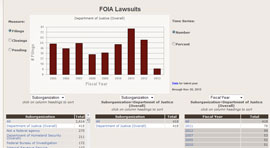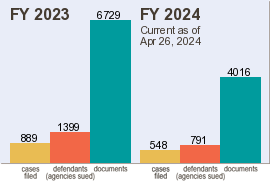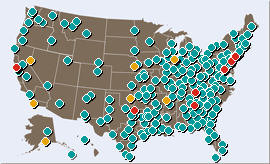We have added 6 decisions of a procedural or substantive nature filed between November 10, 2013 and November 16, 2013. These are associated with 6 FOIA cases pending in federal district court. read more…
29 new FOIA court documents
We have added 29 documents from 5 FOIA cases filed between November 10, 2013 and November 16, 2013. read more…
We have added 4 decisions of a procedural or substantive nature filed between November 3, 2013 and November 9, 2013. These are associated with 3 FOIA cases pending in federal district court. read more…
32 new FOIA court documents
We have added 32 documents from 6 FOIA cases filed between November 3, 2013 and November 9, 2013. read more…
We have added 7 decisions of a procedural or substantive nature filed between October 27, 2013 and November 2, 2013. These are associated with 6 FOIA cases pending in federal district court. read more…
7 new FOIA court documents
We have added 7 documents from 1 FOIA case filed between October 27, 2013 and November 2, 2013. read more…
What’s In a Name?
By Harry Hammitt
Editor/Publisher, Access Reports
The name or affiliation used when submitting a FOIA request is something that can have serious unintended consequences for the requester and, thus, is a strategic decision requesters need to consider before committing themselves. Two recent cases from the U.S. District Court for the District of Columbia provide a good illustration of what can happen when an agency questions the identity of the requester. Although the cases are not related to each other, they involve the same requester—Public Employees for Environmental Responsibility (PEER), a public interest group that represents employees in whistleblower actions as well as making FOIA requests in its own name. In PEER v. Dept. of Commerce, 2013 WL 4830966 (D.D.C.), the National Marine Fisheries Service (NMFS) argued PEER was not the official requester for records about an agency contract employee, even though the email request was signed by PEER’s executive director. Instead, the agency contended that since PEER had made the request on behalf of Jonathan Lee Combs, the former contract employee, he was the actual requester. As a result, the agency asserted that PEER could not challenge the agency’s denial of its fee waiver request because it was not the requester. In the second case, PEER v. U.S. International Boundary and Water Commission, 2013 WL 4830915 (D.D.C.), the International Boundary and Water Commission (IBWC) argued that PEER was not entitled to $40,000 in attorney’s fees because $32,000 of that fee request was attributable to work done by Robert McCarthy, a former IBWC attorney PEER had represented in his whistleblower action against the agency. IBWC argued that McCarthy was essentially representing himself and pro se attorneys were not eligible for attorney fee awards.
We have added 7 decisions of a procedural or substantive nature filed between October 20, 2013 and October 26, 2013. These are associated with 6 FOIA cases pending in federal district court. read more…
15 new FOIA court documents
We have added 15 documents from 2 FOIA cases filed between October 20, 2013 and October 26, 2013. read more…
We have added 8 decisions of a procedural or substantive nature filed between October 13, 2013 and October 19, 2013. These are associated with 7 FOIA cases pending in federal district court. read more…
 Recent Tweets
Recent Tweets


